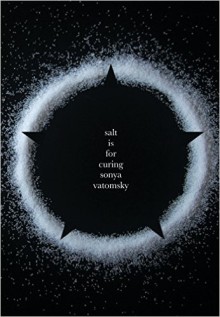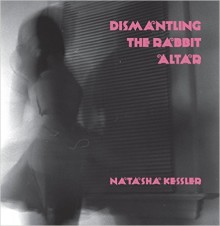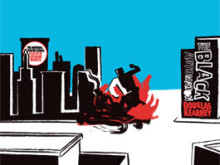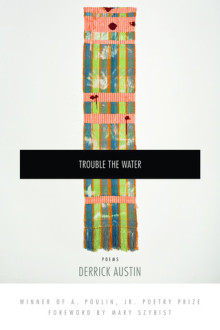 Salt Is For Curing, Sonya Vatomsky (Sator Press, 2015)
Salt Is For Curing, Sonya Vatomsky (Sator Press, 2015)
As a fiction writer, I knew embarrassingly little about contemporary poetry when I bought this little book last fall. It is petite and the typography of its cover is tiny, pale, and unassuming. But this feeling lasts only as long as the book remains closed. Vatomsky’s poems are a series of beautiful sucker punches. Be warned: you won’t catch your breath until the very end. This is the sort of book that demands being read in one sitting. The table of contents is cleverly disguised as a full course dinner; the perfect menu, really: Aperitif, First Course, Second Course, Third Course, Digestif. But then there’s also the lovely oddness of how she reimagines the fairytale, where I found myself rubbing elbows with wolves, witches, and love potions: “The witch cooks / love down in a pot. She feeds herself to / herself; she / grows stronger,” (“Groundmeat”). Her first poem of the First Course, “Threnody in Three Courses” begins with little preamble: “The guests are clockwise around the table: / mother, father, all three brothers, a witch, her lover, / multiple fat housecats and then me, arriving late.” From thereon, we’re with her through the stages of this dim dinner—the glory, the gory, the gorgeousness of it. This book is the best and most terrifying feast you’ll ever be invited to. Her words are bloodthirsty with veracity, opening themselves with commas for butter knives, telling us the story of stories, a magical index of lovers—“Remember me like fingers down the throat of the first time you felt known,” (“Dorian Gray”)—and how beautiful ugly can be, the brutality of the human dream, human hope, the simultaneous human capacity/fatal flaw of loving and being loved and cutting our hearts on others’ teeth: “I bite down my dreams and get goose-feathers stuck between teeth until the only difference between us is you want me dead to bring me back.” (“Dame a la Capuche”). Vatomsky’s book is magic made modern. I’ll leave you with this morsel from the Third Course, if you aren’t already too bewitched to eat another bite: “Keep out my underworld! Neither drag me to hell/ nor drag me out of it, stop filling my mouth with coins for/ some stygian ferryman. Use your words! Ask permission. I am magic enough,” (“Kill Rockstars”).
Mary B. Sellers
 Dismantling the Rabbit Altar, Natasha Kessler (Coconut Books, 2014)
Dismantling the Rabbit Altar, Natasha Kessler (Coconut Books, 2014)
Natasha Kessler’s debut full-length collection, Dismantling the Rabbit Altar, takes the ephemera of fairytales—apples, witch’s shops, wolf pelts, candy—and crams them into poems so small they are forced to create new fables out of each other. Usually, these Frankensteined fairytales are violent and hungry, dangerously glinting their teeth at the many lonely children peppering the pages. As the speaker of the first poem warns, “No one tucks children in anymore.” Children are left to navigate the spectre-filled forest of the collection alone. Unfortunately, the children in Kessler’s foreboding world usually take a more Hansel & Gretel approach to nighttime, and are eventually replaced by “bleeding melons in a wagon.” Even their dreams morph into burning machines: “We are this monster pulling your eyes shut while you sleep.” The speaker has much to admit to over the book’s 75 pages, but she usually does so with disturbing frankness. “I store the babies in tin tin,” she coos before addressing her captives, “I don’t mind, / sweet ones, your nightmare cry.” There’s a sense of tenderness throughout, which calls the speaker’s motives into question. In this world of lopped-off limbs and sugar squares masquerading as teeth, perhaps containment, even digestion, is a suitable parenting strategy. The speaker’s attitude toward children, whether her own or otherwise, is often difficult to discern thanks to her mutable identity. On one page, the speaker could be a victimized princess, and on the next a hag stirring tealeaves into her cauldron. This abundance of identities is complicated further by persistent reference to a “you.” The characters are in constant flux, forcing attention onto the peripheral, the atmospheric, the “something shaking in the corner.” Animals are one of Kessler’s favorite ephemera to force into the candle-lit spotlight of her strange witch’s Sabbath. Whether wolves a la red riding hood or chirping birds courtesy of sleeping beauty, animals saturate the collection as much as they infiltrate the bodies and identities of the “human” characters. “The people replace our names / with wolf heads,” an exiled speaker confesses. In another scene, she is “the girl with a heart on her throat. More like smoked sparrow in a can.” Animals, even rabbits that burrow under the skin, are not immune to the collection’s violence. As Kessler puts it, “My folklore is misbehaving.” She understates.
Ronnie Peltier
 Safe Space, Jos Charles (Ahsahta Press, 2016)
Safe Space, Jos Charles (Ahsahta Press, 2016)
As I opened Jos Charles’s debut book of poetry Safe Space, I was touched by the inscription—“to Jeremy, keep it queer,” with a heart drawn around “queer”—and drawn in by the first line of “Home State”: “u may not know this about me/ but i grew up a gay baby.” As a trans* genderqueer writer, Charles is invested in and compelled by the queering of gender, sexuality, development, body, time, and place—and they explore and expands the boundaries of queer identities and politics by deploying both moments of humor and pain. The title suggests that it is leading you into an emotional “safe space,” but the work begs the question “Is anyone ever safe?” Charles makes quick emotional and temporal shifts in “Trigger Warning” by blurring memories of childish antics, like memorizing the Batman theme at age three, before moving into describing a blowjob. Lines retract, move, and separate from one another, only to meet up again with affective and ever-shifting turns. The nonexistent punctuation and moments of enjambment fuse lines of pain, pleasure, sorrow, memory, sickness, sanity, love, and death together. I was unsure where to draw the lines between often entangled emotions. Indeed, their work adamantly propels against drawing harsh lines, radically insists on carefully navigating colonialist histories of boundary crossing, and substantiates queerness by fucking over the lines that keep marginalized identities from hearing each other and always keeping solidarity at the forefront. Charles’ work is deeply intersectional to its core, and the closer you get to the center, the more powerfully you’ll feel moved to the margins. Invoking memories of sex and sexuality and weaving these in with clever references to pop culture icons like Rhianna, literary figures like Virginia Woolf, and queer activists like Marsha P. Johnson, Charles creates a space in their poetry that is powerfully porous. But ultimately, as the title insists (and simultaneously deconstructs), this book is an amazingly political and vulnerable work on the plurality of queer experiences in our often horrible world, taking it one painful memory at a time, but never forgetting that, for marginalized bodies, agency and pleasure can also be powerful and recuperative.
Jeremy Cornelius
 The Black Automaton, Douglas Kearney (Fence, 2009)
The Black Automaton, Douglas Kearney (Fence, 2009)
Douglas Kearney’s second book bursts forth with a visual and spatial breakdown of the word “N.E.G.R.O”; yet rather than close the definition of a constructed identity, disseminates “[IT]” into a liminal space with arrows questioning multiple forms of reading and rendering. The titular poem, “The Black Automaton In Tag,” is the first of many visual diagrammatic poems that allow for a breakdown of cultural language surrounding identity politics and the process of some totally new formation emerging from the prism-shifting breakage. Kearney’s word-sprawl across the pages is like if the beats of a Dr. Dre song were visualized and strewn together with a wild lyricism. Kearney’s poems are fraught with an intensely smart investment in cultural productions surrounding POC identity in the U.S. (nearly every poem utilizes lines from artists like Young Geezy, Parliament, Flavor Flav), and while these poems are readable without an in depth knowledge of the artists, the full impact of Kearney’s work is missed without it. Yet the complexity and layering of the work is vital to its potential as a poetics inciting query and action, as when the speaker in “Spit Out All Bitterness” directly addresses the “swarthy poet” who is able to “work dirt into mud / to sling, mud to shape into beautiful somethings and useful.” While the speaker encourages the poet to “photograph the gouges your men made,” he also warns against “explorers out / to discover, listening for voices to lomax, / dialects to misinterpret and surfaces / for new flags and maps.” Thus the visual poems-in-series, like “The Black Automaton In De Despair Ub Existence #1-3,” seem to work in crucial ways to counteract this commodification and objectification of a marginalized body and its poetics. Like a recursive ritual across the page, Kearney invokes in these poems modes of cultural production and refractions of the identities created within, arguing, “IT isn’t IT: just like it is.” Douglas Kearney knows language is a tool, though a tool created under systems that favor some and erase others. His work on the page seems both the work of reclamation and formation, similar to practiced disidentification. Channeling Doo-Wop, Bounce, and Hip-Hop musicality is just one of the many layered ways he uses cultural tools to both identify with a traumatic national past and craft an identity-in-constant-emergence in a present futurity. Many of the poems in this book refuse to offer a sense of closure, but rather open up into further action off the page. His most recent book, Mess and Mess, was published by Noemi Press in 2015, and I’m eager to follow Kearney’s necessarily messy and entangled lines of thought there.
Phil Spottswood
 Kill Manual, Cassandra Troyan (2014, Artifice Books)
Kill Manual, Cassandra Troyan (2014, Artifice Books)
On my personal literary landscape, Troyan came out of nowhere. I picked up this substantial, squarish, intense-seeming little book at a friend’s house—lured by its gothic lettering, hooked by the title, and killed by the voyeur-positioning internet chats smattered in its black pages. In these, the drama of a long-distance servant-master relationship unfolds—these morbid, problematic, clipped dialogues meshed with strange lyrical poems; suicide notes; lists comprised of the various afflictions, addictions, and diagnoses of the speaker; dating profiles; descriptions of (s&m) torture and shots of (an)other sub/dom relationship(s), sequentially arranged, which collectively beg questions about the nature of need, desire, power, and kink. It was printed in 2014 by Artifice, an imprint of Curbside Splendor that seems mostly now defunct, or at least inactive—hopefully building up to its next mic drop. I was reading it at AWP while sitting next to Image Text Ithaca’s table—a gorgeous small press based out of Ithaca’s low-residency MFA that introduced me to Grind, a disarming collection of sexts plus dick pics that seemed eerily like Kill Manual’s conceptual sibling. A telling moment in Troyan’s book is when the speaker describes being “horrified when the ice machine went off” while locked in a dog cage in their master’s apartment. Any other excerpt might be far more brutal, but this reposed, heightened moment seems to capture the process of deriving, through objective defilement and humiliation, a relief from the existential trap of ennui—through terror, life. This book is raw and violent. It’s confrontational and unapologetic, compulsive and indulgent. It doesn’t really give a fuck. If you missed its release, like I did, you will want to get this book back on your map.
Laura Theobald
 Trouble the Water, Derrick Austin (BOA Editions, 2016)
Trouble the Water, Derrick Austin (BOA Editions, 2016)
Austin’s debut collection hit me with the weight of a full human birth. It’s so much more than I could have expected from this complex, art-brained poet. It’s strongest lines, so direct and unapologetically wounded and wounding, pierce through the surface of the poems, much as the poem “Blaxploitation” stands out like a monolith within the collection. This poem is a triumph of form and resistance, culminating in sentiments that seize and worry the mind: “…I am black / but beautiful, razor blades all up in my hair. Black / power. He touches me by not knowing how.”—the “but” a moment of execution; the “touch” a kind of revival, pulled off with a bit of magic, reminding us that our failures can make us human, and loveable, and not. There’s a cross section in Austin’s work that’s completely singular—where John the Baptist meets RuPaul, say—and the effect manifests in lines that can haunt you for the rest of your damn life: “Where are you? I need a solitary room with you in it. Wall me in. Lie down on me.” The violence, when it appears, is stunning—as in, it stuns. Its presence is sudden, shocking, and defiant among so much gentleness and play on behalf of the speaker. The speaker is, in a very visible way, troubled by it; and he aims to return its shock back outwards, towards its source, to trouble the water that has been troubled, the water that is both singular and divided.
Laura Theobald
Mary B. Sellers is pursuing her MFA in Fiction at Louisiana State University. Originally from Jackson, MS, she now lives in Baton Rouge with her dog, Daisy Buchanan. Important activities include: drinking wine and eating tacos on a regular basis. She wants to be a mermaid when she grows up.
Ronnie Peltier studies poetry at Louisiana State University and is the poetry editor for New Delta Review. He enjoys staying indoors and watching drag queen videos.
Jeremy Cornelius is a first-year English PhD student at Louisiana State University. He currently works in queer theory, affect studies, and poetry. He will be researching zines in the residency program at the Queer Zine Archive Project in Milwaukee this summer. Other interests include his pet rabbit Pietro and gay sailors.
Phillip Spotswood was born into a Catholic family and turned out queer. His work can be found in SunDog Lit, Heavy Feather Review, Cartridge Lit, and is forthcoming in Hobart. He is a MFA Poetry candidate at LSU, and an assistant poetry editor at the New Delta Review.
Laura Theobald is the author of the chapbooks edna poems, the best thing ever, and eraser poems. She has an MFA in poetry from Louisiana State University where she served as Editor of New Delta Review. She currently serves as Assistant Editor to Spooky Girlfriend Press and as a book designer for Boaat. She grew up in the Florida Keys and lives in New Orleans.